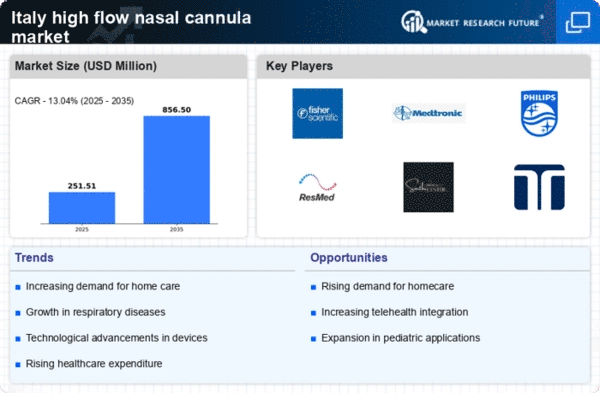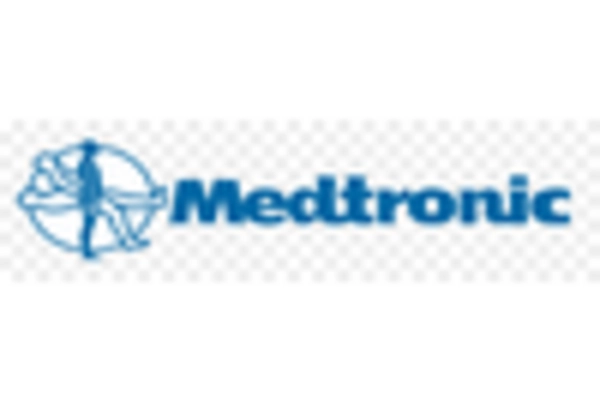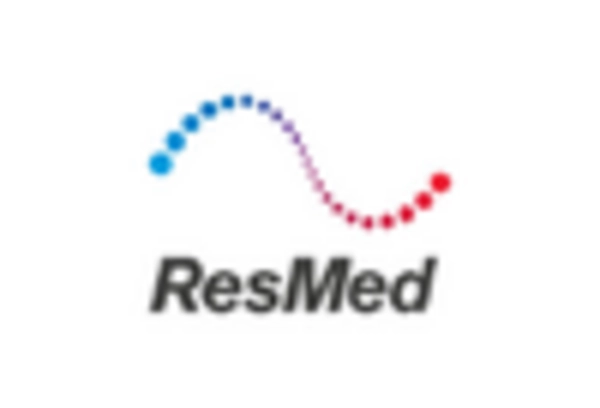Rising Focus on Patient-Centric Care
The high flow-nasal-cannula market is also benefiting from a growing emphasis on patient-centric care within the Italian healthcare system. This approach prioritizes the comfort and preferences of patients, leading to a greater acceptance of non-invasive respiratory therapies. High flow nasal cannula systems are recognized for their ability to provide effective oxygen delivery while enhancing patient comfort. As healthcare providers shift towards more personalized treatment plans, the demand for high flow nasal cannula solutions is likely to increase. This trend aligns with broader healthcare objectives aimed at improving patient satisfaction and outcomes, thereby fostering growth in the high flow-nasal-cannula market.
Growing Awareness and Training Programs
There is a rising awareness among healthcare professionals regarding the efficacy of high flow nasal cannula therapy, which is likely to drive the market forward. Training programs and workshops are being implemented across Italy to educate medical staff on the benefits and proper usage of high flow nasal cannula systems. This educational push is essential, as it equips healthcare providers with the knowledge needed to effectively utilize these technologies in clinical settings. As more professionals become proficient in administering high flow nasal cannula therapy, the market is expected to witness increased adoption rates. This trend suggests a promising future for the high flow-nasal-cannula market, as enhanced training correlates with improved patient outcomes.
Aging Population and Associated Health Issues
Italy's demographic landscape is characterized by an aging population, which is likely to have a profound impact on the high flow-nasal-cannula market. As individuals age, they often experience a higher prevalence of chronic respiratory conditions, such as chronic obstructive pulmonary disease (COPD) and pneumonia. This demographic shift is expected to drive the demand for effective respiratory therapies, including high flow nasal cannula systems. According to recent statistics, approximately 25% of the Italian population is over 65 years old, a figure that is projected to increase. Consequently, healthcare providers are likely to invest more in advanced respiratory support technologies, thereby propelling the growth of the high flow-nasal-cannula market in Italy.
Enhanced Healthcare Infrastructure Investments
The Italian government is making substantial investments in healthcare infrastructure, which is anticipated to positively influence the high flow-nasal-cannula market. These investments aim to modernize hospitals and healthcare facilities, ensuring they are equipped with the latest medical technologies. As part of this initiative, there is a focus on improving respiratory care services, which includes the integration of high flow nasal cannula systems. Reports suggest that healthcare spending in Italy is expected to rise by 5% annually, reflecting a commitment to enhancing patient care. This increased funding is likely to facilitate the adoption of innovative respiratory therapies, thereby expanding the high flow-nasal-cannula market.
Increasing Demand for Non-Invasive Ventilation
The high flow-nasal-cannula market in Italy is experiencing a notable surge in demand for non-invasive ventilation solutions. This trend is largely driven by the growing awareness among healthcare professionals regarding the benefits of high flow nasal cannula therapy in managing respiratory distress. Studies indicate that non-invasive methods can reduce the need for intubation, thereby minimizing complications associated with invasive procedures. As hospitals and clinics increasingly adopt these technologies, the market is projected to grow at a compound annual growth rate (CAGR) of approximately 8% over the next five years. This shift towards non-invasive options reflects a broader movement within the healthcare sector to enhance patient comfort and outcomes, positioning the high flow-nasal-cannula market as a critical component of respiratory care in Italy.
















